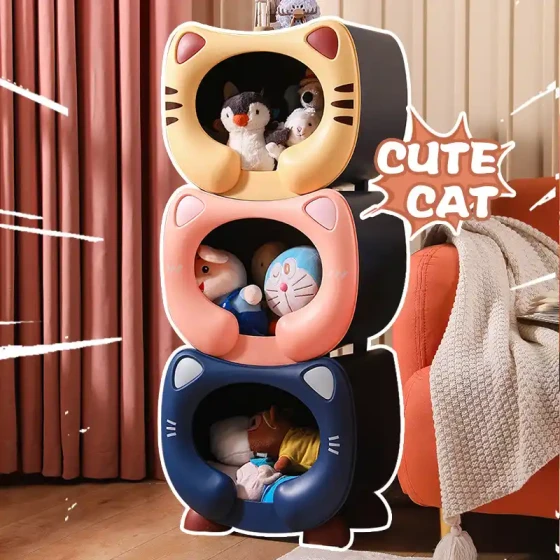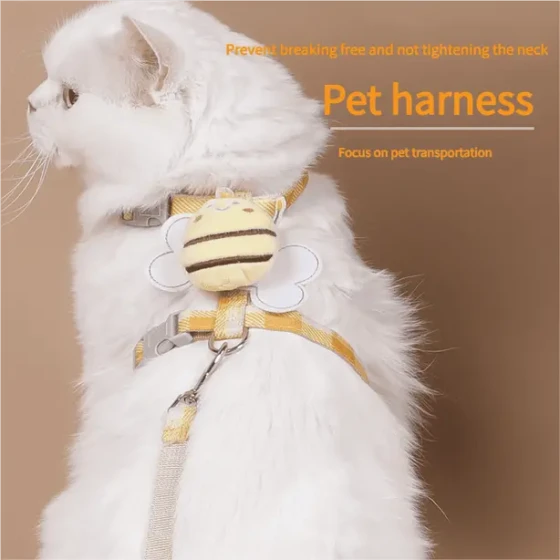Cat's Stress Response After Being Hit_Why Sudden Defecation Occurs When Frightened
Cats may exhibit a series of stress responses after being frightened or experiencing immense pressure, with sudden defecation being a common manifestation. This usually occurs because the cat’s body is responding to an emergency situation, activating the sympathetic nervous system, which temporarily shuts down non-essential functions such as digestion, triggering a rapid emptying of the intestines. This reaction is not intentional but an instinctive part of their “fight or flight” response.
Cat Stress Responses: More Than Just a "Startle"

Just like humans feel stomach discomfort or faster heartbeat under great pressure, cats also experience a series of physiological and psychological reactions when faced with sudden, unpredictable, or uncontrollable situations. This is known as a “stress response.” This reaction is an innate instinct in animals, aimed at helping them survive better during dangerous moments.
Stress triggers can vary from small events such as moving house, strangers or new pets arriving at home, to larger causes like sudden loud noises, or even scolding or hitting by the owner. Some cats are more “socially anxious” and will become tense from the slightest disturbance; others are braver and adjust more quickly. Regardless, chronic or excessive stress can damage a cat’s physical and mental health.
Why Does Sudden Defecation Occur When Frightened? There's "Science" Behind It!
When a cat is frightened, its body quickly enters the "fight or flight" mode. At this time, their sympathetic nervous system is instantly stimulated and releases hormones such as adrenaline. Imagine this as pressing an "emergency button" in the body, mobilizing all energy and resources to cope with immediate danger. In this urgent state, less immediately critical functions, like digestion, are temporarily put aside.
Gastrointestinal peristalsis slows down or even stops, while muscles in the intestines and bladder may suddenly relax, causing the contents to be rapidly expelled. This may sound unbelievable, but in the wild, it might reduce weight for faster running or disperse or deter potential predators through scent. So, when your cat suddenly defecates after being scared, it is not misbehaving or holding a grudge, but a natural instinctive bodily response to an emergency.
What Are the "Weak Spots" in a Cat’s Stress Response?
Besides sudden defecation, cats’ stress responses vary widely, just like their personalities. Some “dramatic” cats show very obvious signs, while some “introverted” cats quietly endure it. As responsible owners, we need to keep our eyes open and promptly notice their "help signals."
Common stress symptoms in cats include:
- Behavioral changes: Longer hiding time, reduced activity range, less playfulness, increased alertness, easily startled, and sometimes aggression (hissing, flattened ears, biting, scratching).
- Physiological changes: Loss of appetite or overeating, overgrooming causing localized hair loss, vomiting, diarrhea or constipation, rapid breathing, inappropriate urination.
- Body language: Tense body lowered down, dilated pupils, whiskers pulled back, tail tucked between legs.
If your cat exhibits these symptoms, especially those rarely seen before, be alert that it might be under stress.
How to Soothe a Frightened "Poor Little One"?
If your cat is frightened from being hit or other causes, as the owner, the first thing you need to do is stay calm. Cats are very sensitive animals, and your nervousness will also affect them.
Here are some ways to help calm a frightened cat:
- Provide a safe space: Offer a quiet, concealed place for the cat to hide, such as a cardboard box, cat bed, or elevated spot. Do not force it out; let it calm down gradually on its own.
- Keep distance and give "harmless" signals: Avoid staring directly or suddenly approaching or making loud noises. Try slow blinking, a friendly gesture between cats. Sit down and lower your height to show you are not a threat.
- Speak softly: Use a gentle, calm tone when talking to your cat so it hears a familiar voice.
- Provide food and water: Place food and water near its hiding spot to ensure it can replenish energy anytime.
- Offer familiar items: Put favorite blankets or toys nearby; familiar scents can help soothe it.
- Use support products: Spray cat pheromones (chemicals mimicking facial gland secretions) in the environment or offer catnip to help some cats relax.
- Do not punish: Stress behaviors are not intentional, and punishment will only increase fear and pressure.
- Rebuilding trust takes time: If your cat fears you because of your actions, you need patience and time to regain its trust. Avoid causing fear or harm again.
Long-Term Stress: The Invisible Health Killer
Occasional stress responses are normal physiological mechanisms, but chronic high stress turns from a "lifesaver" into a "health killer." Long-term stress causes hormone imbalances and weakens the immune system, making cats more prone to illness.
Long-term stress may cause the following health issues:
- Digestive problems: Chronic diarrhea, constipation, vomiting, gastritis, etc.
- Urinary issues: Cystitis, urinary retention, and other lower urinary tract diseases.
- Skin problems: Dermatitis and hair loss from excessive licking.
- Immune disorders: Reduced resistance, making infections like feline herpesvirus, panleukopenia, or even feline infectious peritonitis more likely.
- Behavioral problems: Increased aggression, inappropriate elimination, depression, anxiety, etc.
Severe stress reactions may even cause sudden death in cats, though rare, but related diseases can seriously harm a cat’s health and lifespan.
Prevention Is Better Than Cure: How to Give Your Cat a "Worry-Free" Life?
The best way to cope with stress is prevention. Understand your cat’s habits, minimize factors that cause them tension, and provide a stable, safe, and comfortable living environment.
- Stable environment: Avoid frequent moving or rearranging furniture. If changes are necessary, do it gradually to let the cat adapt.
- Regular routine: Maintain fixed feeding, playing, and resting times to make your cat feel secure and in control.
- Adequate resources: Ensure enough litter boxes, food bowls, and water bowls in quiet, convenient places and keep them clean.
- Provide hiding places and high spots: Cats like to hide and observe from high places. Offering cat beds, boxes, and cat trees enhances their sense of security.
- Gentle interaction: Respect your cat’s wishes, don’t force cuddles or interaction. Learn to understand their body language to avoid discomfort.
- Reduce noise and scares: Avoid sudden loud noises near your cat; educate family and visitors to treat them gently.
- Gradual adaptation to new things: Whether switching food, introducing new pets, or new family members, proceed slowly and give your cat enough adaptation time.
- More companionship and play: Spend time with your cat; interactive games help expend energy and relieve stress while strengthening bonds.
- Regular health checks: Take your cat to the vet regularly to rule out potential health issues, as illness can also cause behavioral abnormalities.
Frequently Asked Questions
- How long does a cat take to recover after being frightened?
Mild scares may subside quickly. For serious fright or sensitive cats, recovery can take longer and may leave psychological shadows. The key is to provide a safe environment, avoid further triggers, and patiently wait for recovery. - What to do if a cat has diarrhea from stress?
First confirm if stress causes the diarrhea and exclude other health problems. Consult a veterinarian. Under veterinary guidance, probiotics may be given to help regulate the gut. - Do cats hold grudges if they are hit?
Cats do not "hold grudges" like humans, but a traumatic experience can make them fearful or distrustful of you. Rebuilding trust requires time and patience, using positive interaction and behavior to reduce their wariness. - How to tell if a cat is under long-term stress?
Watch for persistent changes in behavior, appetite, elimination habits, and sleep patterns. Prolonged hiding, loss of appetite, inappropriate elimination, or excessive grooming may indicate chronic stress. Consulting a vet or animal behavior expert is recommended.
Summary
Cats exhibit stress responses, including sudden defecation, after being hit or frightened, as an innate physiological defense mechanism. Responsible owners should understand the causes, signs, and potential harms of stress responses in cats. Avoid actions that may frighten or harm them, and provide a stable, safe, and loving environment. This is the best way to prevent and alleviate stress. If stress symptoms persist or worsen, seek professional veterinary help promptly to ensure your cat’s health and happiness.





